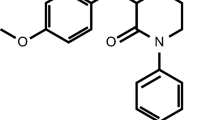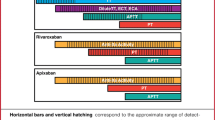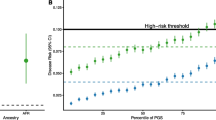Abstract
Background
There is considerable inter-individual variability in warfarin dosages necessary to achieve target therapeutic anticoagulation. Polymorphisms in genes, which master warfarin pharmacokinetics and pharmacodynamics, might influence warfarin dose variation. Genes encoding drug transporters, such as human multidrug resistance (MDR1), as well as epoxide hydrolase 1 (EPHX1), which is a putative subunit of the vitamin K epoxide reductase, and Protein Z (PZ), which is a vitamin K-dependent plasma glycoprotein, are among those candidate genes.
Objective
The purpose of this study was to investigate the contribution of MDR1 C3435T, EPHX1 H139R and PZ A-13G gene polymorphisms in warfarin dose variation in a cohort of the Egyptian population.
Methods
Eighty-four patients whose international normalized ratio (INR) was in the range of 2–3, 41 males and 43 females, with a mean (±SD) age of 40.9 (13.3) years were recruited into this study. MDR1 C3435T, EPHX1 H139R and PZ A-13G gene polymorphisms were detected by polymerase chain reaction-restriction fragment length polymorphism. Primarily, linear regression analysis, including the variables age, gender, MDR1 C3435T, EPHX1 H139R and combined MDR1 C3435T, EPHX1 H139R and PZ A-13G genotypes, was used to assess the effective factors for warfarin maintenance dose. Secondly, the previously examined cytochrome P450 (CYP) 2C9 A1075C and vitamin K epoxide reductase complex subunit 1 (VKORC1) C1173T were added to the regression analysis.
Results
Warfarin dose/week was not influenced by each of the MDR1 C3435T, EPHX1 H139R, and PZ A-13G gene polymorphisms when examined separately. However, when these single nucleotide polymorphisms (SNPs) were combined, MDR1 TT/EPHX1 RH,RR/PZ AA subjects showed statistically significant increase in warfarin dose/week when compared with MDR1 CC/EPHX1 RH,RR/PZ AA subjects [median (25th–75th percentiles): 49.0 (42.0–59.5) vs. 35.0 (24.5–42.0) mg/week, respectively] (p = 0.014). In contrast, in the presence of wild-type EPHX1 HH, there was a decrease in warfarin dose/week in MDR1 TT subjects when compared with CT and CC subjects [median (25th–75th percentiles): 22.0 (17.5–30.6), 42.0 (35.0–49.0) and 42.0 (28.0–54.3) mg/week, respectively] (p = 0.005 and 0.030, respectively). Age had a significant contribution (p = 0.048) to the overall variability in warfarin dose. Calculated weekly dose = 52.928 − (0.289 × age) + (9.709 × combined genotype). The multivariate linear regression equation of warfarin maintenance dose accounted for about 8 % of variation in dose (R 2 = 0.079), age accounted for 5 % of variation, while combined genotypes added the extra 3 %. However, the new regression equation accounted for 20.9 % of variation in dose. Age accounted for 5 %, while VKORC1 C1173T accounted for an extra 13 % of variation and MDR1 C3435T accounted for the remaining 3 % of variation. Calculated dose = 64.909 − (0.282 × age) − (13.390 × VKORC1) − (7.164 × MDR1). Correlation analysis showed a close and significant relationship between the calculated and actual warfarin dose (r = 0.457; p < 0.0005).
Conclusion
Warfarin dose/week was significantly influenced by the combined MDR1 C3435T and EPHX1 H139R gene polymorphism since no polymorphism of PZ A-13G SNP was detected in our studied Egyptian population. Future studies with larger sample size will be needed to confirm our findings before definitive conclusions can be made.

Similar content being viewed by others
References
Yoshizawa M, Hayashi H, Tashiro Y, et al. Effect of VKORC1-1639 G>A polymorphism, body weight, age, and serum albumin alterations on warfarin response in Japanese patients. Thromb Res. 2009;124:161–6. doi:10.1016/j.thromres.2008.11.011.
Ma Q, Lu AY. Pharmacogenetics, pharmacogenomics, and individualized medicine. Pharmacol Rev. 2011;63(2):437–59. doi:10.1124/pr.110.003533.
Carlquist JF, Horne BD, Mower C, et al. An evaluation of nine genetic variants related to metabolism and mechanism of action of warfarin as applied to stable dose prediction. J Thromb Thrombolysis. 2010;30(3):358–64. doi:10.1007/s11239-010-0467-3.
Krynetskiy E, McDonnell P. Building individualized medicine: prevention of adverse reactions to warfarin therapy. J Pharmacol Exp Ther. 2007;322:427–34.
Wadelius M, Sörlin K, Wallerman O, et al. Warfarin sensitivity related to CYP2C9, CYP3A5, ABCB1 (MDR1) and other factors. Pharmacogenomics J. 2004;4:40–8.
Sharma V, Kaul S, Al-Hazzani A, et al. Association of C3435T multi drug resistance gene-1 polymorphism with aspirin resistance in ischemic stroke and its subtypes. J Neurol Sci. 2012;315:72–6.
Taubert D, von Beckerath N, Grimberg G, et al. Impact of P-glycoprotein on clopidogrel absorption. Clin Pharmacol Ther. 2006;80(5):486–501.
Shabana MF, Mishriki AA, Issac MS, et al. Do MDR1 and SLCO1B1 polymorphisms influence the therapeutic response to atorvastatin? A study on a cohort of Egyptian patients with hypercholesterolemia. Mol Diagn Ther. 2013;17:299–309. doi:10.1007/s40291-013-0038-3.
García M, Macías RM, Cubero JJ, et al. ABCB1 polymorphisms are associated with cyclosporine induced nephrotoxicity and gingival hyperplasia in renal transplant recipients. Eur J Clin Pharmacol. 2013;69:385–393. doi:10.1007/s00228-012-1355-x.
Skov J, Bladbjerg EM, Leppin A, et al. The influence of VKORC1 and CYP2C9 gene sequence variants on the stability of maintenance phase warfarin treatment. Thromb Res. 2013;131:125–9.
Li YH, Wang YH, Li Y, et al. MDR1 gene polymorphisms and clinical relevance. Actu Cenetica Sinica. 2006;33:93–104.
Reaves AB, Clarke CJ, Tillman EM. Supratherapeutic international normalized ratio due to reduced vitamin K intake secondary to prolonged vomiting in a patient on warfarin. Ann Pharmacother. 2013;47(6):e28. doi:10.1345/aph.1R688.
Wu AHB, Shin J. MDR1 polymorphism and warfarin resistance detection: is this the missing link? Pers Med. 2011;8(6):611–613.
SNP linked to Gene ABCB1 (geneID: 5243) Via contig annotation. http://www.ncbi.nlm.nih.gov/SNP/snp_ref.cgi?chooseRs=coding&locusId=5243&mrna. Accessed 17 Aug 2013.
Hamidovic A, Hahn K, Kolesar J. Clinical significance of ABCB1 genotyping in oncology. J Oncol Pharm Pract. 2010;16:39–44.
Qiang G, Yan K, Jörn S, et al. VKORC1-1639G>A, CYP2C9, EPHX1691A>G genotype, body weight, and age are important predictors for warfarin maintenance doses in patients with mechanical heart valve prostheses in southwest China. Eur J Clin Pharmacol. 2010;66:1217–27.
Hassett C, Aicher L, Sidhu JS, et al. Human microsomal epoxide hydrolase: genetic polymorphism and functional expression in vitro of amino acid variants. Hum Mol Genet. 1994;3(3):421–8.
Omiecinski CJ, Hassett C, Hosagrahara V. Epoxide hydrolase-polymorphism and role in toxicology. Toxicol Lett. 2000;112–113:365–70.
Hassett C, Lin J, Carty CL, et al. Human hepatic microsomal epoxide hydrolase: comparative analysis of polymorphic expression. Arch Biochem Biophys. 1997;337(2):275–83.
Guenthner TM, Cai D, Wallin R. Co-purification of microsomal epoxide hydrolase with the warfarin-sensitive vitamin K1 oxide reductase of the vitamin K cycle. Biochem Pharmacol. 1998;55:169–75.
Sejima H, Hayashi T, Deyashiki Y, et al. Primary structure of vitamin K-dependent human protein Z. Biochem Biophys Res Commun. 1990;171:661–8.
Bafunno V, Santacroce R, Margaglione M. The risk of occurrence of venous thrombosis: focus on protein Z. Thromb Res. 2011;128:508–15.
Fujimaki K, Yamazaki T, Taniwaki M, et al. The gene for human protein Z is localized to chromosome 13 at band q34 and is coded by eight regular exons and one alternative exon. Biochemistry. 1998;37:6838–46.
Staton J, Sayer M, Hankey GJ, et al. Protein Z gene polymorphisms, protein Z concentrations, and ischemic stroke. Stroke. 2005;36:1123–7.
Rice GI, Futers TS, Grant PJ. Identification of novel polymorphisms within the protein Z gene, haplotype distribution and linkage analysis. Thromb Haemost. 2001;85:1123–4.
Miletich JP, Broze GJ Jr. Human plasma protein Z antigen: range in normal subjects and the effect of warfarin therapy. Blood. 1987;69:1580–6.
Ekladious SM, Issac MS, Sharaf SA, et al. Validation of a Proposed warfarin dosing algorithm based on the genetic make-up of Egyptian patients. Mol Diagn Ther. doi:10.1007/s40291-013-0046-3. Epub 10 July 2013.
Cascorbi I, Gerloff T, Johne A, et al. Frequency of single nucleotide polymorphisms in the P-glycoprotein drug transporter MDR1 gene in white subjects. Clin Pharmacol Ther. 2001;69:169–74.
Lichy C, Kropp S, Dong-Si T. A common polymorphism of the protein Z gene is associated with protein Z plasma levels and with risk of cerebral ischemia in the young. Stroke. 2004;35:40–5.
De Oliveira Almeida VC, De Souza Ferreira AC, Ribeiro DD, et al. Association of the C3435T polymorphism of the MDR1 gene and therapeutic doses of warfarin in thrombophilic patients. J Thromb Haemost. 2011;9:2120–2.
Siegmund W, Ludwig K, Giessmann T, et al. The effects of the human MDR1 genotype on the expression of duodenal P-glycoprotein and disposition of the probe drug talinolol. Clin Pharmacol Ther. 2002;72:572–83.
Greiner B, Eichelbaum M, Fritz P, et al. The role of intestinal P-glycoprotein in the interaction of digoxin and rifampin. J Clin Invest. 1999;104:147–53.
Morita Y, Sakaeda T, Horinouchi M, et al. MDR1 genotype-related duodenal absorption rate of digoxin in healthy Japanese subjects. Pharm Res. 2003;20:552–6.
Hoffmeyer S, Burk O, von Richter O, et al. Functional polymorphisms of the human multidrug-resistance gene: multiple sequence variations and correlation of one allele with P-glycoprotein expression and activity in vivo. Proc Natl Acad Sci USA. 2000;97:3473–8.
Zhang WX, Chen GL, Zhang W, et al. MDR1 genotype do not influence the absorption of a single oral dose of 100 mg talinolol in healthy Chinese males. Clin Chim Acta. 2005;359:46–52.
Taubert D, von Beckerath N, Grimberg G, et al. Impact of p-glycoprotein on clopidogral absorption. Clin Pharmacol Ther. 2006;80:486–501.
Nakamura T, Sakaeda T, Ohmoto N, et al. Real-time quantitative polymerase chain reaction for MDR1, MRP1, MRP2, and CYP3AmRNA levels in Caco-2 cell lines, human duodenal enterocytes, normal colorectal tissues, and colorectal adenocarcinomas. Drug Metab Dispos. 2002;30:4–6.
Woodahl EL, Ho RJ. The role of MDR1 genetic polymorphisms in interindividual variability in P-glycoprotein expression and function. Curr Drug Metab. 2004;5:11–9.
Saraeva RB, Paskaleva ID, Doncheva E, et al. Pharmacogenetics of acenocoumarol: CYP2C9, CYP2C19, CYP1A2, CYP3A4, CYP3A5 and ABCB1 gene polymorphisms and dose requirements. J Clin Pharm Ther. 2007;32:641–9.
Kim RB, Leake BF, Choo EF, et al. Identification of functionally variant MDR1 alleles among European Americans and African Americans. Clin Pharmacol Ther. 2001;70:189–99.
Shuen AY, Wong BYL, Fu L, et al. Evaluation of the warfarin-resistance polymorphism, VKORC1 Asp36Tyr, and its effect on dosage algorithms in a genetically heterogeneous anticoagulant clinic. Clin Biochem. 2012;45:397–401.
Schelleman H, Brensinger CM, Chen J, et al. New genetic variant that might improve warfarin dose prediction in African Americans. Br J Clin Pharmacol. 2010;70:393–9.
Wadelius M, Chen LY, Lindh JD, et al. The largest prospective warfarin-treated cohort supports genetic forecasting. Blood. 2009;113:784–92.
Pautas E, Moreau C, Gouin-Thibault I, et al. Genetic factors (VKORC1, CYP2C9, EPHX1, and CYP4F2) are predictor variables for warfarin response in very elderly, frail inpatients. Clin Pharmacol Ther. 2010;87:57–64.
Lee MT, Chen CH, Chou CH, et al. Genetic determinants of warfarin dosing in the Han-Chinese population. Pharmacogenomics. 2009;10:1905–13.
Chan SL, Thalamuthu A, Goh BC, et al. Exon sequencing and association analysis of EPHX1 genetic variants with maintenance warfarin dose in a multiethnic Asian population. Pharmacogenet Genomics. 2011;21:35–41.
Loebstein R, Vecsler M, Kurnik D, et al. Common genetic variants of microsomal epoxide hydrolase affect warfarin dose requirements beyond the effect of cytochrome P450 2C9. Clin Pharmacol Ther. 2005;77:365–72.
Yang X, Liang SH, Weyant DM, et al. The expression of human microsomal epoxide hydrolase is predominantly driven by a genetically polymorphic far upstream promoter. J Pharmacol Exp Ther. 2009;330:23–30.
Wadelius M, Chen LY, Eriksson N, et al. Association of warfarin dose with genes involved in its action and metabolism. Hum Genet. 2007;121:23–34.
Shikata E, Ieiri I, Ishiguro S, et al. Association of pharmacokinetic (CYP2C9) and pharmacodynamic (factors II, VII, IX, and X; proteins S and C; and γ-glutamyl carboxylase) gene variants with warfarin sensitivity. Blood. 2004;103:2630–5. doi:10.1182/blood-2003-09-3043.
Shahin MH, Khalifa SI, Gong Y, et al. Genetic and nongenetic factors associated with warfarin dose requirements in Egyptian patients. Pharmacogenet Genomics. 2011;21(3):130–5.
Hamdy SI, Hiratsuka M, Narahara K, et al. Genotype and allele frequencies of TPMT, NAT2, GST, SULT1A1 and MDR-1in the Egyptian population. Br J Clin Pharmacol. 2003;55:560–9.
Le Cam-Duchez V, Barbay V, Bal Dit Sollier C, et al. Haplotypic or genotypic combinations of three protein Z polymorphisms influence protein Z plasma level. Thromb Haemost. 2009;101:212–4.
Rice GI, Futers TS, Grant PJ. Identification of novel polymorphisms within the protein Z gene, haplotype distribution and linkage analysis. Thromb Haemost. 2001;85:1123–4.
The International Warfarin Pharmacogenetics Consortium. Estimation of the warfarin dose with clinical and pharmacogenetic data. N Engl J Med. 2009;360(8):753–64.
Rusdiana T, Araki T, Nakamura T, et al. Responsiveness to low-dose warfarin associated with genetic variants of VKORC1, CYP2C9, CYP2C19, and CYP4F2 in an Indonesian population. Eur J Clin Pharmacol. 2013;69:395–405.
D’Andrea G, D’Ambrosio R, Margaglione M. Oral anticoagulants: pharmacogenetics relationship between genetic and non-genetic factors. Blood Rev. 2008;22(3):127–40.
Teh LK, Langmia IM, FazleenHaslinda MH, et al. Clinical relevance of VKORC1 (G-1639A and C1173T) and CYP2C9*3 among patients on warfarin. J Clin Pharm Ther. 2012;37:232–6.
Cini M, Legnani C, Cosmi B, et al. A new warfarin dosing algorithm including VKORC1 3730 G>A polymorphism: comparison with results obtained by other published algorithms. Eur J Clin Pharmacol. 2012;68(8):1167–74.
Xu D, Liu Y, Zhong S-L, et al. Effect of demographic factors on warfarin dosing in patients after cardiac valve replacement. J Pract Med. 2010;5:750–3.
Jonas DE, McLeod HL. Genetic and clinical factors relating to warfarin dosing. Trends Pharmacol Sci. 2009;30(7):375–86.
Acknowledgements and Disclosures
The preparation of this article was not supported by any external funding. The authors have no conflicts of interest that are directly relevant to the content of this article.
Author information
Authors and Affiliations
Corresponding author
Electronic supplementary material
Below is the link to the electronic supplementary material.
Rights and permissions
About this article
Cite this article
Issac, M.S.M., El-Nahid, M.S. & Wissa, M.Y. Is There a Role for MDR1, EPHX1 and Protein Z Gene Variants in Modulation of Warfarin Dosage? A Study on a Cohort of the Egyptian Population. Mol Diagn Ther 18, 73–83 (2014). https://doi.org/10.1007/s40291-013-0055-2
Published:
Issue Date:
DOI: https://doi.org/10.1007/s40291-013-0055-2




